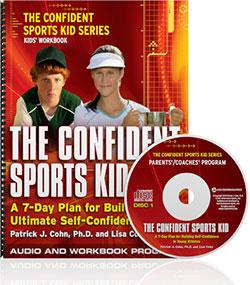
Sports Kids Playing in their Comfort Zones
Many young athletes hold themselves back with so-called comfort zones. What is a comfort zone? A comfort zone is a mental barrier that limits what young athletes think they are capable of achieving. Comfort zones are difficult to shake, but this article will help you identify the signs of these mental barriers and offer suggestions as to how to help your kid move past them.
Comfort zones become a challenge when young athletes are playing better than expected and don’t want to take risks. For example, if your athlete usually scores six points in a basketball game, this may become his expectation. If he scores his six points in the first half of the game, his comfort zone may limit him from scoring 12 points, even if that is a real possibility for him.
Comfort zones are created in the mind. They are caused by the athlete’s expectations about what is and what is not possible to achieve. They are created from past experiences.
For another example, a young golfer wants to achieve a higher score.Her past experience shows her that she will shoot between 82 and 86 on most days, and this forms her comfort zone. This also becomes a scoring barrier or an expected scoring range.
If she is performing better than her own expectations and has a chance to break 90, this can cause her to feel anxious. She may start thinking too much about her score, and on results and outcomes. The possibility to shoot a good score becomes a distraction that gets in the way of her best game.
Athletes controlled by comfort zones will play tentatively. For instance, when a team feels they are playing “over their heads,” such as winning a game they expected to lose, they tend to protect the lead and play too defensively. They worry too much about making mistakes and blowing a good performance. They will not take the risks needed for a great performance.
As the name implies, a comfort zone is a place the athlete is accustomed too. They feel comfortable there. Whether young athletes are performing better or worse than expected, they feel anxious or frustrated to be outside of what they are used to. The bottom line is that athletes lose their composure when this starts to happen.
Top 4 signs that your kid is controlled by his comfort zone
- They are nervous, anxious, or afraid when playing better than expected.
- They lose confidence when playing better than expected
- They sit on their lead and play defensively or are afraid to risk.
- They focus on not making mistakes rather than focusing on their own game.
Helping your Kid Perform Beyond the Comfort Zone
Kids should recognize the signs that they are outside of their comfort zone and that it might sabotage their performance. Young athletes need to identify the expectations that limit their performance, and as parents, you can guide them in this understanding. Pay special attention to this when an athlete is performing at their peak level.
Kids can learn how to play without allowing their comfort zone to control them. They should be encouraged to challenge themselves to push beyond their mental barriers. They should discard their expectations that keep them stuck in a comfort zone. Kids can set positive goals for themselves, and you as parents can help facilitate that.
Another thing that parents can do is to help kids stop making judgments about how well they are performing. Kids should not compare how they are doing in the present with how they expected to do. Keep them focused on their goal and the steps they need to take to achieve their goal.
Remember that comfort zones apply to areas outside of sports as well. Kids will benefit from the mental skills they gain from sports in all aspects of their lives. Once they have strategies for achievement, it will translate into other areas. Understanding their comfort zones in sports, academics, financial, career, and personal areas will make it possible to achieve much more than they can imagine.
Related Sports Psychology Articles
- How Impatience in Youth Sports Leads to Burnout
- Self-Criticism In Youth Athletes
- Helping Young Athletes Stay Calm
*Subscribe to The Ultimate Sports Parent Podcast
*Subscribe to Peak Performance Sports on Youtube
Download a free sports psychology report to improve your mental game!
The Confident Sports Kid

When kids lack confidence, they doubt themselves, stop taking risks, play tentatively, and are hard on themselves. As a result, kids often lose their motivation to improve. Ultimately, these barriers keep them from enjoying sports and making the most of their physical talent.
“The Confident Sports Kid” program is actually two programs: one that teaches sports parents how to boost their kids’ confidence, and another that teaches young athletes age 8 to 18 how to improve their self talk, avoid negative thinking, overcome expectations that limit confidence, and much more. The program will help kids boost their confidence in sports and life…and enjoy sports more.
